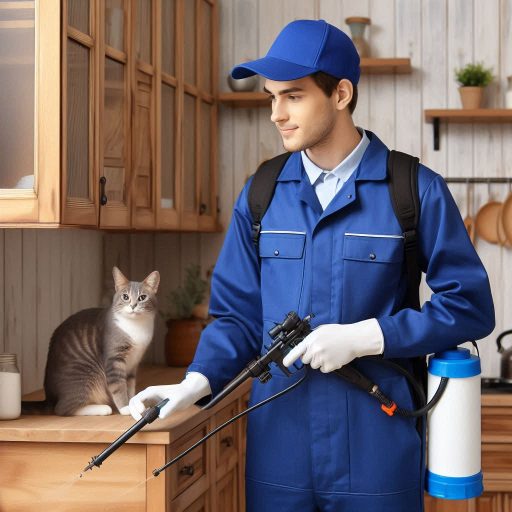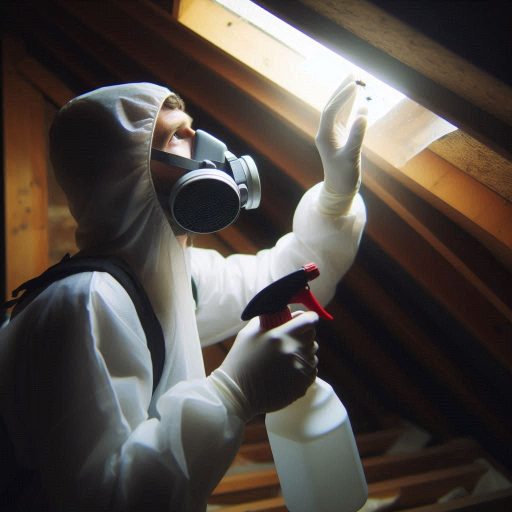Introduction
Becoming a certified pest control worker opens doors to a rewarding career.
This profession addresses the critical need for pest management in homes and businesses.
Certification validates your skills and knowledge, ensuring you meet industry standards.
In the pest control industry, certification is vital.
It enhances your credibility and builds trust with clients.
Many states require certification to ensure that workers handle chemicals safely and effectively.
Moreover, certified professionals often earn higher wages than their non-certified counterparts.
With certification, you can explore various career opportunities.
You might work for pest control companies, government agencies, or even start your own business.
Some certified workers specialize in residential pest management, while others focus on commercial or agricultural pest control.
Additionally, certification opens up pathways for advancement.
Many certified pest control workers become supervisors, trainers, or consultants.
The potential for growth in this field is significant, offering stability and job satisfaction.
By obtaining certification, you invest in your future and contribute to public health and safety.
Research and Understand the Requirements
Becoming a certified pest control worker starts with thorough research.
Understanding the requirements can set you on the right path.
Here‘s how to begin your journey.
Different Types of Certifications Available
First, familiarize yourself with the various certifications.
Pest control certifications vary widely across states and countries.
Some certifications focus on specific pest control methods, while others cover general practices.
Common certifications include commercial pesticide applicator licenses and structural pest control certifications.
Each certification requires a different level of knowledge and skill.
In the United States, the Environmental Protection Agency (EPA) regulates pesticide usage.
Many states require certification for applying pesticides commercially.
Each state has its specific guidelines.
Research these guidelines to identify the certifications relevant to your career goals.
Online resources and local pest control associations can provide valuable information.
Consider exploring national certifications as well.
Organizations like the National Pest Management Association (NPMA) offer certifications that enhance credibility.
These certifications may provide additional training in pest management practices.
Understanding these options can help you decide which path aligns best with your career aspirations.
Research the Specific Requirements for Certification in Your State or Country
Next, dive into the specific requirements for your location.
Each state or country has its certification processes.
Visit the websites of your local regulatory agencies to gather information.
You can also find guidelines for pest control worker certification on government websites.
Typically, you‘ll need to complete a certain number of training hours.
This training may include classroom instruction and hands-on experience.
States often require passing written and practical examinations.
Understanding these prerequisites is crucial for a smooth certification process.
Don‘t forget to explore the fees associated with certification.
Costs can vary significantly depending on your location and the certification type.
Knowing these fees upfront can help you budget accordingly.
Understand the Qualifications and Experience Needed to Become Certified
Clarify the qualifications and experience necessary for certification.
Most states require a high school diploma or equivalent.
Some states may prefer applicants with additional education, such as an associate or bachelor’s degree in a related field.
Experience often plays a critical role in certification.
Many programs require applicants to gain hands-on experience through apprenticeships or internships.
These experiences help you understand pest control methods and practices in real-world settings.
Seek out opportunities with local pest control companies to gain valuable insights.
Additionally, consider obtaining specialized training.
Certifications in areas like termite control, rodent control, and integrated pest management can enhance your qualifications.
Specialized training makes you a more attractive candidate in a competitive job market.
Researching and understanding the requirements for pest control certification is essential.
Explore the types of certifications available to you.
Investigate the specific requirements in your state or country.
Grasp the qualifications and experience needed for successful certification.
Taking these steps ensures you build a strong foundation for a rewarding career in pest control.
Stay informed, and stay proactive as you embark on this journey.
Your efforts now will pay off in the long run.
Read: How Much Do Pet Groomers Earn in the USA?
Complete Educational Requirements
Becoming a certified pest control worker requires meeting specific educational requirements.
This step ensures you possess the knowledge and skills needed for success in the industry.
Follow these guidelines to complete your educational requirements effectively.
Enroll in a Pest Control Training Program or Course
Start your journey by enrolling in a pest control training program or course.
Many community colleges, trade schools, and online platforms offer these programs.
Choose a program that suits your schedule and learning style.
Look for accredited institutions that provide comprehensive pest management education.
During your training, you will learn about various pest species, their behaviors, and effective control measures.
Courses often include practical training, giving you hands-on experience.
Engage actively in class discussions and seek help when needed.
Gain Knowledge of Common Pests, Pesticides, and Safety Procedures
Understanding common pests is crucial for any pest control worker.
Study the biology and behavior of pests like rodents, insects, and termites.
This knowledge helps you identify pests and their infestations accurately.
Familiarize yourself with various pest control methods, including chemical and non-chemical options.
Pesticides play a significant role in pest control.
Learn about different types of pesticides, their applications, and potential side effects.
Understand the environmental impact of pesticide use and how to minimize risks.
Always prioritize safety when handling these substances.
Safety procedures are vital in this field.
Familiarize yourself with personal protective equipment (PPE) and how to use it properly.
Understand the importance of following safety protocols to protect yourself and others.
Many training programs include sections on safety procedures, so pay close attention.
Obtain Any Necessary Certifications or Licenses Required for the Field
After completing your training, check the certification and licensing requirements in your state.
Most states require pest control workers to obtain specific licenses before starting their careers.
Research the requirements thoroughly, as they may vary by location.
To obtain a license, you may need to pass an exam.
This exam often covers pest identification, pesticide application, and safety regulations.
Prepare adequately for the exam by reviewing your course materials and taking practice tests.
Some states also require continuing education to maintain your license.
Stay informed about any new laws or techniques in the pest control industry.
Participate in workshops or seminars to fulfill these requirements.
Gaining certifications in specialized areas, such as termite control or integrated pest management (IPM), can boost your career prospects.
Pursuing additional credentials demonstrates your commitment to professional growth.
Completing your educational requirements is essential to becoming a certified pest control worker.
Enroll in a training program, gain knowledge about pests and safety procedures, and obtain the necessary licenses.
With determination and effort, you can successfully enter this rewarding field.
Read: Top Pet Grooming Conferences and Expos in the USA
Gain Practical Experience
Gaining practical experience is crucial for becoming a certified pest control worker.
Internships or apprenticeships provide valuable learning opportunities.
You will acquire hands-on skills and knowledge necessary for success in the field.
Seek Out Internships or Apprenticeships with Established Pest Control Companies
Start by seeking internships or apprenticeships with established pest control companies.
These programs often offer structured training and mentorship.
Many companies look for motivated individuals eager to learn and grow.
Research local pest control companies and inquire about their internship programs.
Many firms advertise openings on their websites or through job boards.
Networking within the industry can also help you find opportunities.
During your internship, observe experienced professionals as they work.
Pay attention to their techniques, tools, and methods.
Ask questions to deepen your understanding of pest control practices.
Learn On-the-Job Skills and Techniques from Experienced Professionals
Learning from experienced professionals is one of the best ways to gain practical knowledge.
They can teach you various skills, such as pest identification and treatment methods.
Understanding the life cycles of pests will help you develop effective control strategies.
Shadowing seasoned technicians allows you to witness real-life pest control scenarios.
Take notes on the different situations they encounter.
This observation will help you understand how to adapt your approach based on the pest and environment.
Participate actively during your training.
Don‘t hesitate to assist in daily tasks.
Engaging in hands-on work will reinforce what you learn from your mentors.
Whether it‘s setting traps, applying treatments, or documenting results, each task will build your competence.
Additionally, familiarize yourself with industry standards and regulations.
Understanding the legal and safety requirements is essential.
Experienced professionals will guide you through compliance with state and federal guidelines.
This knowledge will not only enhance your skills but also ensure safe practices in the field.
Get Hands-On Experience in Pest Identification, Treatment Methods, and Industry Standards
Getting hands-on experience in pest identification is vital.
Learn to recognize common pests in your area.
Familiarize yourself with their behaviors and habitats to develop effective treatment plans.
Practice identifying pests in real-world situations.
During your apprenticeship, take the initiative to examine different environments.
Whether in homes, businesses, or agricultural settings, each experience will deepen your understanding.
Learn about various treatment methods, including chemical and non-chemical options.
Experienced professionals will guide you in selecting the most effective approach.
They will also teach you about product safety and application techniques.
Moreover, understanding industry standards is crucial for your development.
Stay informed about the latest practices, technologies, and regulations.
Join professional organizations and attend workshops to expand your knowledge.
Networking with peers and mentors will help you stay updated.
Engage in discussions about trends and challenges in pest control.
This collaboration will enhance your skills and broaden your perspectives.
Gaining practical experience is a vital step in becoming a certified pest control worker.
By seeking internships or apprenticeships, learning from experienced professionals, and getting hands-on experience, you will build a strong foundation.
This foundation will prepare you for a successful career in pest control.
Embrace every opportunity to learn and grow in this dynamic industry.
Read: Educational Requirements for Childcare Workers Explained

Prepare for the Certification Exam
Becoming a certified pest control worker requires thorough preparation for the certification exam.
This step is crucial for your success.
By studying effectively, you can increase your chances of passing the exam on your first try.
Study and Review the Material Covered in the Certification Exam
Start your preparation by gathering the exam material.
Most states provide guidelines on what topics the certification exam covers.
Focus on core subjects such as pest biology, pesticide safety, and application techniques.
Create a study schedule that breaks down the material into manageable sections.
Dedicate specific times each day to focus on studying.
Use this schedule to stay organized and ensure you cover everything before the exam date.
Take detailed notes while you study.
Summarize key points and highlight important information.
Reviewing these notes frequently helps reinforce your understanding of the material.
Make sure to revisit challenging topics multiple times to gain confidence.
Take Practice Tests to Assess Your Knowledge
Practice tests serve as a valuable tool in your preparation.
They allow you to assess your knowledge and identify areas that need improvement.
Many organizations offer sample questions or past exams.
Use these resources to familiarize yourself with the exam format and types of questions you may encounter.
After taking a practice test, review your answers thoroughly.
Analyze your mistakes to understand where you went wrong.
This analysis helps you focus your study efforts on weaker areas.
Set a goal to improve your score on each subsequent practice test.
Incorporating practice tests into your routine not only boosts confidence but also reduces exam anxiety.
The more comfortable you are with the exam format, the more prepared you will feel on test day.
Consult Study Guides, Online Resources, and Industry Publications
Utilize a variety of resources to enhance your preparation.
Study guides specifically designed for pest control certification exams are widely available.
These guides often provide summaries of essential topics, practice questions, and tips for success.
Online resources also offer a wealth of information.
Many websites provide free or paid courses tailored to certification requirements.
Consider joining online forums where you can interact with other aspiring pest control workers.
Engaging in discussions can clarify doubts and provide additional insights.
Industry publications, such as pest management journals and newsletters, keep you updated on the latest trends and research.
Reading these materials expands your knowledge and keeps you informed about changes in pest control practices.
Thorough preparation is key to passing the certification exam.
Study and review the exam material diligently.
Incorporate practice tests to gauge your readiness.
Consult various study guides and online resources to enrich your understanding.
By following these steps, you can boost your confidence and achieve certification as a pest control worker.
Transform Your Career Today
Unlock a personalized career strategy that drives real results. Get tailored advice and a roadmap designed just for you.
Start NowRead: Top Certifications for Advancing in Childcare Careers
Schedule and Take the Exam
Preparing for your certification exam is crucial to becoming a certified pest control worker.
This section outlines key steps to ensure you are ready for the exam day.
Register for the Certification Exam
Start by registering for the certification exam through the appropriate governing body.
Visit their official website to find the registration form.
Complete the form accurately to avoid any issues.
Pay any required fees as part of the registration process.
Keep a copy of your registration confirmation for your records.
Check the registration deadline and complete your application well in advance.
This proactive approach will help you avoid last-minute stress.
Review the Exam Schedule, Location, and Requirements Ahead of Time
Once registered, review the exam schedule carefully.
Most organizations publish exam dates online, so check frequently for updates.
Find the specific date and time of your exam.
Make sure you know the location of the exam center.
Research the address and plan your route to arrive on time.
Consider using GPS or mapping apps for directions.
Double-check the exam’s format, whether it’s written, practical, or both.
Knowing the structure will help you prepare effectively.
Understanding the exam requirements is essential for success.
Review the candidate handbook provided by the governing body.
This handbook typically outlines the topics covered in the exam.
Familiarize yourself with any materials or study guides recommended.
Check if there are any specific items you need to bring, like identification or tools.
Knowing what to expect will help ease your nerves on exam day.
If the governing body offers practice exams, take advantage of them.
These resources will familiarize you with the types of questions you might encounter.
Preparation on the day before the exam sets the tone for success.
Pack your bag with all necessary materials the night before.
Include identification, writing utensils, and any other required tools.
Set aside time for a final review of your study materials.
Go over any notes, flashcards, or practice tests one last time.
Avoid cramming, as this can increase anxiety and reduce retention.
Aim to get a good night’s sleep to ensure you feel rested and alert.
Arrive Prepared, well-rested and Confident
On exam day, arrive at the testing location early.
This gives you time to settle in and avoid last-minute stress.
Take a deep breath and focus on staying calm.
Use relaxation techniques, such as deep breathing or visualization, to ease any anxiety.
Trust in your preparation and knowledge.
Remind yourself that you have put in the hard work to reach this point.
When you sit for the exam, read each question carefully.
Manage your time wisely during the test.
Stay focused and give each question your best effort.
Following these steps will help ensure you are well-prepared for your certification exam.
Remember that preparation and confidence go hand in hand.
Good luck on your journey to becoming a certified pest control worker!
Maintain Certification and Continuing Education
As a certified pest control worker, your journey doesn’t end once you obtain your certification.
You must actively maintain your certification and pursue continuing education to stay relevant in the industry.
This commitment not only keeps your knowledge up-to-date but also enhances your skills and professionalism.
Here‘s how you can achieve this goal effectively.
Stay Up-to-Date on the Latest Industry Trends, Regulations, and Best Practices
The pest control industry evolves continuously.
New pests appear, and control methods improve, making it crucial to stay informed.
Regularly read industry publications and newsletters to understand current trends and research.
Subscribing to relevant magazines will provide insights into new techniques and products.
Joining professional organizations, such as the National Pest Management Association (NPMA), offers additional resources.
These organizations often share important updates about regulatory changes and emerging practices.
Attending industry conferences and trade shows can further broaden your understanding.
Engaging with fellow professionals allows you to share knowledge and experiences, enhancing your expertise.
Understanding the regulations governing pest control is equally important.
Federal and state laws can change frequently, affecting how you operate.
Regularly check the websites of organizations like the Environmental Protection Agency (EPA) to stay compliant.
Being aware of these regulations not only keeps you legal but also helps build trust with clients.
Participate in Continuing Education Courses or Workshops to Enhance Your Skills
Continuing education plays a vital role in your professional development.
Participating in courses and workshops helps you learn new techniques and advancements in pest control.
Many organizations offer specialized training tailored to specific areas, such as insect identification or pesticide application.
Look for workshops that provide hands-on training, as these can be particularly beneficial.
Practical experience allows you to apply what you‘ve learned directly.
You can find many online courses that offer flexibility, enabling you to learn at your own pace.
This accessibility makes it easier to fit education into your busy schedule.
Additionally, consider pursuing certifications in specialized areas.
Obtaining credentials in specific pest management techniques can enhance your marketability.
Clients often seek professionals with advanced training, so these certifications can set you apart from competitors.
Renew Your Certification as Required by the Governing Body or Organization
Most states and governing bodies require pest control workers to renew their certifications periodically.
Check the specific renewal requirements for your state or organization, as they can vary.
Typically, you will need to complete a set number of continuing education hours to qualify for renewal.
Plan your educational activities early to avoid any last-minute rush.
Keep detailed records of your completed courses and their corresponding credits.
Organizing this information makes the renewal process easier and ensures you meet all necessary requirements on time.
Maintaining your certification and pursuing continuing education is essential for success as a pest control worker.
Stay updated on industry trends, regulations, and best practices to enhance your knowledge.
Actively participate in courses and workshops to improve your skills.
Adhere to renewal requirements set by governing bodies to keep your certification current.
By committing to these practices, you ensure a successful and fulfilling career in pest control.
Network and Build Professional Relationships
Networking is essential for becoming a successful certified pest control worker.
Building professional relationships will open doors to opportunities, knowledge, and industry insights.
Follow these strategies to effectively network and establish meaningful connections in the pest control industry.
Join Industry Associations or Organizations for Pest Control Professionals
Begin by joining industry associations related to pest control.
Organizations like the National Pest Management Association (NPMA) provide valuable resources for pest control professionals.
Membership grants access to training, certifications, and important industry updates.
Joining these associations connects you with like-minded individuals who share your interests.
Participating in local chapters enhances your networking opportunities.
You can meet fellow members, share experiences, and exchange valuable tips.
Being active in these groups increases your visibility within the pest control industry.
Attend Conferences, Seminars, and Networking Events to Meet Other Professionals in the Field
Conferences and seminars serve as excellent venues for networking.
Attend events focused specifically on pest control and related fields.
Engage with speakers and attendees to broaden your professional network.
These gatherings also provide insights into industry trends and challenges.
Prepare in advance by researching the speakers and participants.
Knowing their backgrounds allows for more meaningful conversations.
Don‘t hesitate to introduce yourself and share your goals.
Active participation helps you stand out and build lasting connections.
Build Relationships with Colleagues, Mentors, and Potential Employers in the Pest Control Industry
Strengthening relationships with colleagues in the pest control field enhances your professional network.
Collaboration fosters teamwork and creates a positive work environment.
Share knowledge, resources, and support each other‘s professional growth.
Engage in joint projects or initiatives.
Working together on pest control challenges builds camaraderie.
Offer assistance when a colleague faces a difficult task.
This approach not only enhances your skills but also establishes you as a reliable team member.
Finding a mentor can significantly impact your career trajectory.
Identify experienced professionals in the pest control industry who can guide you.
A mentor offers valuable advice, shares industry insights, and helps you navigate challenges.
Reach out to potential mentors with a clear purpose.
Explain why you admire their work and what you hope to learn.
Establishing this relationship can lead to new opportunities and professional growth.
Utilize social media platforms to connect with industry professionals.
LinkedIn is a powerful tool for networking.
Follow pest control groups and engage in discussions to showcase your knowledge.
Share articles, insights, and experiences related to pest control.
This strategy positions you as an active participant in the industry.
Engaging online helps you connect with professionals worldwide and expands your network.
Networking and building professional relationships are essential for success as a certified pest control worker.
By joining industry associations, attending events, and leveraging social media, you can create a strong professional network.
Take the initiative to engage and watch your career flourish.
Consider Specializing or Advancing Your Career
Specializing in pest control can open new doors in your career.
Focusing on specific areas, such as termite control or wildlife management, enhances your expertise.
Clients appreciate specialists who understand their unique pest issues.
They often prefer professionals with in-depth knowledge and skills.
By choosing a specialization, you set yourself apart from general pest control workers.
Explore Opportunities for Specialization
Begin by researching various specialization options within the pest control field.
Termite control is a popular area, given the significant damage termites can cause.
Wildlife management also attracts many, as it involves handling various animals that invade homes and businesses.
Each specialization requires different training and knowledge.
Consider enrolling in courses or workshops to gain specialized skills.
Many organizations offer training programs tailored to specific pest control areas.
Completing these programs not only builds your expertise but also boosts your credibility.
Employers often look for workers with specialized training.
By becoming a specialist, you can increase your chances of higher pay and job security.
Showcase Your Business Today
Reach thousands of readers actively exploring professional services. Publish your business profile and grow your audience now.
Publish NowPursue Advanced Certifications or Licenses
After selecting a specialization, pursue advanced certifications or licenses to enhance your qualifications.
Certifications show your commitment to professionalism and ongoing education.
Many states and organizations offer additional certification programs that cater to different pest control niches.
Look for recognized certifications, such as those offered by the National Pest Management Association (NPMA).
These programs require passing exams and completing continuing education courses.
Gaining such credentials can make you more competitive in the job market.
Advanced licenses can also enable you to perform more complex pest control tasks.
Stay Proactive in Seeking New Opportunities
Always stay proactive in seeking opportunities for growth and advancement in your pest control career.
Join professional organizations to network with other industry experts.
Attending conferences, workshops, and seminars can expose you to new trends and technologies in pest management.
These events often feature discussions on emerging pests, innovative treatments, and regulatory changes.
Consider mentorship opportunities as well.
Connecting with experienced professionals can provide valuable insights and guidance.
Mentors can share their experiences, helping you navigate challenges in your career.
Additionally, they can recommend advanced training programs and certifications relevant to your goals.
Regularly update your skills and knowledge to remain relevant in the industry.
Take advantage of online courses and webinars that focus on the latest pest control techniques.
This dedication to learning demonstrates your commitment to your profession.
Clients and employers value individuals who continually strive for improvement.
Specializing in pest control and pursuing advanced certifications can significantly enhance your career prospects.
Explore specialization opportunities, such as termite control or wildlife management.
Stay proactive by seeking new growth opportunities and networking within the industry.
Embrace a mindset of continuous learning, and you‘ll position yourself for success in the ever-evolving field of pest control.
See Related Content: Understanding Airline Policies for Baggage Handlers
Conclusion
Becoming a certified pest control worker requires several key steps.
First, you must meet your state’s educational requirements.
Next, gain hands-on experience through an apprenticeship or internship.
Afterward, pass your state certification exam to demonstrate your knowledge.
Ongoing education is crucial in the pest control industry.
New pest management techniques and products constantly emerge, and staying updated is essential.
Many states require continuing education credits to maintain certification.
Engaging in workshops, seminars, or online courses keeps your skills sharp and relevant.
Professional development enhances your career prospects.
Networking with other professionals can lead to job opportunities and mentorship.
Joining industry associations can provide resources and support as you grow in your career.
I encourage you to take these necessary steps toward certification.
Pursue your training with dedication and commitment.
A career in pest control offers opportunities for growth and stability.
By becoming certified, you position yourself for success in this essential field.
Start your journey today and contribute to creating safer, pest-free environments for your community.
[E-Books for Sale]
The Big Book of 500 High-Paying Jobs in America: Unlock Your Earning Potential
$19.99 • 500 High-Paying Jobs • 330 pages
Explore 500 high-paying jobs in America and learn how to boost your career, earn more, and achieve success!
See All 500 High-Paying Jobs of this E-Book
1001 Professions Without a Degree: High-Paying American Jobs You Can Start Now
$19.99 • 1001 Professions Without a Degree • 174 pages
Discover 1001 high-paying jobs without a degree! Unlock career tips, skills, and success strategies for just $19.99!




